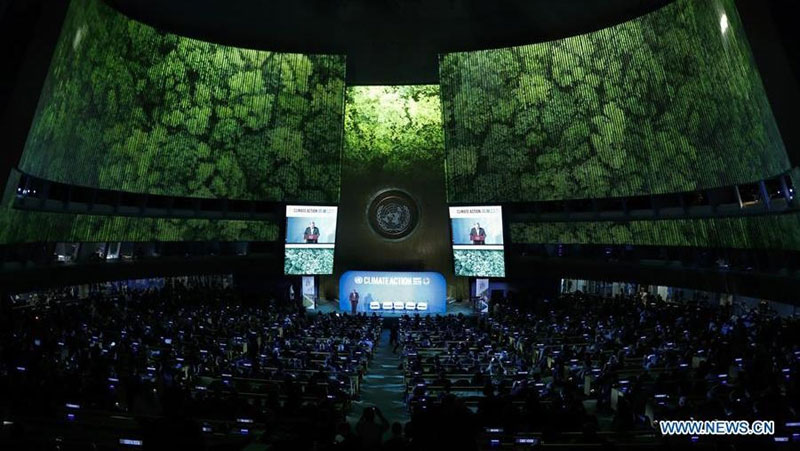


 Photo
taken on September. 23, 2019 shows the United Nations Climate Action Summit
opening at the UN headquarters in New York.
Photo
taken on September. 23, 2019 shows the United Nations Climate Action Summit
opening at the UN headquarters in New York.
In the context that climate change is threatening the development of the world, the conference was convened to sound the alarm of responsibility as well urge governments and businesses to act to prevent risks emanating from global warming. In recent days, a series of youth marches took place everywhere around the world to call attention to the urgent issues related to the fight against climate change. Millions of people took to the streets in cities around the world to call for a stop to the planet's threat due to rising temperature. The participants including many students chanted slogans and held up banners bearing the words "No planet B."
As planned, there will be about 5,800 marches held this week, in 163 countries around the world. In the US alone, more than 800 marches are planned and about 400 others in Germany. In Washington D.C., thousands of people arrived at Capitol Hill, carrying slogans emphasising the urgency of the climate crisis. In capital cities of Germany, the UK and France as well as many other European countries, marches all focused on the topic of combating climate change, with calls for not cutting down forests; reducing waste; saying no to cars with too much oil consumption. Climate issues also heated up parliaments and are one of the key policies that have been put forward in election campaigns in many countries.
The movements call for people to raise their awareness of environmental protection and require world leaders to accelerate the implementation of the commitments in the Paris Agreement on Climate Change in 2015, in which, set a goal on holding the increase in the global average temperature to well below 2C and ideally at 1.5C, above pre-industrial levels. However, the latest UN reports warned that current plans would lead to a rise in average global temperatures of between 2.9C and 3.4C by 2100, a shift likely to bring catastrophic change across the globe.
The last four years have been the hottest four years since experts began recording a record of temperatures in 1850. The gap between what needs to be done and what is actually happening today is widening. Instead of decreasing as expected, greenhouse gas (CO2) emissions increased by 2% in 2018 and reached a record 37 billion tonnes. Extreme weather patterns in the 2015-2019 period affected all continents and many new records of continuously rising temperatures are established. Last July was a record-breaking hot month, causing many unprecedented serious forest fires to occur in the North as well. Previously, forest fires in June emitted 50 million tonnes of CO2 into the atmosphere.
Scientific advisory group for UN climate change summit stressed that the world needs to urgently take action to prevent global warming and limit the serious impacts from climate change. In order to maintain global temperatures below 2C, countries need to triple the scale of their emissions reduction targets, and five times to maintain them below 1.5C. Technically, these ambitions are thought to be possible, but require the vigorous efforts of the international community.
News about disasters, natural disasters worldwide shows the "dark” picture of the earth's climate. Instead of just appeals and commitments, the UN wants this summit to act as a forum for governments to share specific models and plans on how to reduce greenhouse gas emissions. And when the Paris Agreement enters an important phase of its implementation next year, the world needs real actions, not just commitments, to fulfil its responsibility to save the "green planet”.
Source: NDO